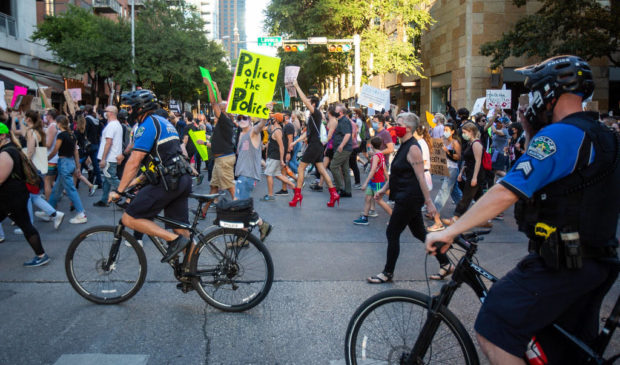Group begins collecting signatures to put state law limiting police oversight to a vote
Wednesday, October 7, 2020 by
Audrey McGlinchy, KUT A new political action committee is trying to put a state law governing police oversight on the ballot next May.
“I think it’s really unique and kind of amazing that (this petition could) allow the voters in Austin to decide if we want to change how policing is done in Austin,” Eric Wikman, treasurer of the Police Oversight Project, told KUT.
While Texas laws are not normally subject to repeal by petitions, Chapter 143 of the Texas Local Government Code is a bit different. Texas allows municipalities to decide whether they want to adopt the law, which Austin voters did in 1948, and municipalities can also decide whether to repeal it with a public vote.
Criminal justice advocates in Austin have long bemoaned Chapter 143 and the limits it places on the oversight of policing. For example, the state code requires that police chiefs discipline officers for misconduct within 180 days of an incident. It also prohibits departments from releasing an officer’s personnel files to the public.
Chapter 143 also prohibits a police chief from being fired, which came to the public’s attention this summer when activists began asking the city to fire APD Chief Brian Manley. Legally, he can only be demoted.
While police contracts can deviate from the state law, and Austin’s does to some extent, advocates for reform call Chapter 143 a “baseline” from which contract negotiations typically start. And they say having the state law as a starting point makes it more difficult to advocate for significant change in contracts.
“There really isn’t any way for our City Council, who are the people that we vote for, to directly impact how the policing is done in Austin,” said Wikman, who co-owns Full Circle Bar in East Austin.
When reached by phone Tuesday, Ken Casaday, president of the Austin Police Association, said he’d just heard about the petition effort that morning.
“If that’s what people want to do that’s what they can do,” he said.
A similar petition drive is happening in San Antonio.
Getting it on the ballot will require some heavy lifting. State law requires that the number of signatures equal 10 percent of the total city voters in the previous election. Since petitioners are aiming to get this on the May ballot, the number of signatures they’ll need to collect will depend on voter turnout in November.
Wikman estimates 600,000 Austin voters will go to the polls next month, meaning his group will need to collect about 60,000 signatures. That’s far more than in other local petition drives, which typically require 20,000 signatures.
“It’s a significant amount,” Wikman said. “There’s definitely a challenge there.”
This story was produced as part of the Austin Monitor’s reporting partnership with KUT.
The Austin Monitor’s work is made possible by donations from the community. Though our reporting covers donors from time to time, we are careful to keep business and editorial efforts separate while maintaining transparency. A complete list of donors is available here, and our code of ethics is explained here.
You're a community leader
And we’re honored you look to us for serious, in-depth news. You know a strong community needs local and dedicated watchdog reporting. We’re here for you and that won’t change. Now will you take the powerful next step and support our nonprofit news organization?











